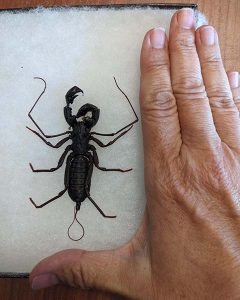- The name giant whip scorpion, Mastigoproctus giganteus giganteus (Lucas), may draw fear in the public perception.
- The sight of this arachnid, also known as a vinegaroon or grampus, might further draw unrealistic public perceptions of its dangerous qualities.
- University of Florida experts at the Institute of Food and Agricultural Sciences (UF/IFAS) explain the realities of this species and what to do if you happen to run into one in Florida.

FORT LAUDERDALE, Fla. — With recent media exposure of an arachnid known as the giant whip scorpion, the public perception of this species tends to draw some concerns over its potential for harm to humans, pets and the environment.
In a co-authored article found on Ask IFAS, William Kern, an associate professor in the department of entomology and nematology at UF/IFAS Fort Lauderdale Research and Education Center, gives us a closer look at the arachnid known to spray an acid if molested.
For added measure, here are seven extra bites of information from Kern.
Q: Are giant whip scorpions dangerous to humans and pets?
A: No. They are neither venomous nor physically hazardous. They can give a mild pinch with their pincers (pedipalps). Most mammals and birds will not eat them because they are distasteful, but not poisonous.
Q: Are giant whip scorpions considered invasive to the environment?
A: The Florida giant whip scorpion is native to Florida. In 2018, the Florida population was elevated to a species rather than a subspecies.
Q: Where are they most likely to be found in Florida?
A: The Florida whip scorpion lives in deep, well-drained sandy soils like long-leaf pine sandhills, sand pine scrub, coastal and relict dunes. They may have burrows, but often just burrow under logs and boards on the ground. Their population has been declining due to habitat loss and over-collecting for the pet trade.
Q: Your article states that the species will bite under certain conditions. What are these conditions? Is the bite painful and venomous?
A: I have never been bitten by a whip scorpion. They will try to defend themselves by pinching you with their pedipalps. It is a mild pinch, like being bitten by a small anole (lizard). They are considered harmless to people and pets.
Q: One of the facts reported in the article is that it can spray acetic acid. What condition causes this giant whip scorpion to do so and what do I do if I, my family or pets are sprayed?
A: This is a defensive behavior and they spray a fine mist of acetic acid (somewhat stronger than food grade vinegar) at predators that get too close. The spray can sting the eyes and irritate the nose and doesn’t taste good. It comes from two pores at the base of the “whip”. They are actually pretty accurate with the spray. On skin it usually does no harm, but just wash the exposed skin with soap and water before you touch your eyes. If it gets in your eyes, flush them with clean water.
Q: If I find one on my property, is there a likelihood that there are others? If so, how do I get rid of them?
A: It is possible that if you find one, then your property is the right habitat for them, so there may be more. Why get rid of them? They are harmless, eat cockroaches and millipedes, and they are cool.
Q: Do people have these species as pets?
A: Unfortunately, they are sought as pets, but they rarely do well in captivity. Collection for the pet trade has had a negative impact on most populations, especially in Florida. Appreciate them in the field then leave them in peace. They are very photogenic, so you don’t need to collect them.
-30-
By Lourdes Mederos
The mission of the University of Florida Institute of Food and Agricultural Sciences (UF/IFAS) is to develop knowledge relevant to agricultural, human and natural resources and to make that knowledge available to sustain and enhance the quality of human life. With more than a dozen research facilities, 67 county Extension offices, and award-winning students and faculty in the UF College of Agricultural and Life Sciences, UF/IFAS brings science-based solutions to the state’s agricultural and natural resources industries, and all Florida residents.
ifas.ufl.edu | @UF_IFAS
 2
2

Comments are closed.